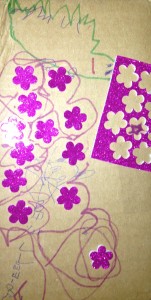

Not cover to cover, as you would a novel. Rather I pick them up, flip through the pages, pause to dip into them in search of new words to file away mentally. I relish new words so I’m always looking for them, especially sinewy and interesting new verbs, or nouns crusted with bits of morphological history.
I know I’m not alone in this — it’s a disease that many (though certainly not all, or even most, I think) writers (and some non-writers) share, and it’s not one its sufferers talk about much, because Good LORD how boring is that, reading the dictionary?
I have an American Heritage I’ll never part with, and beyond that the beloved Compact OED, three volumes and accompanying magnifying glass, that my brother Lowell got for me while I was in grad school and which will be with me till my dying days, I firmly well. And specialized dictionaries: a Penguin Dictionary of Symbols, a dictionary of foreign terms, another of fashion terms, and a glut of foreign language dictionaries, Russian, Hawaiian, Navaho, jostle for space on one on my most visited bookshelves.
...
Want access to a lively community of writers and readers, free writing classes, co-working sessions, special speakers, weekly writing games, random pictures and MORE for as little as $2? Check out Cat’s Patreon campaign.

"(On the writing F&SF workshop) Wanted to crow and say thanks: the first story I wrote after taking your class was my very first sale. Coincidence? nah….thanks so much."

In this Medium article, Cat Rambo discusses some of science-fiction story rules that can help create rich and multi-layered speculative stories.


This site is protected by reCAPTCHA and the Google Privacy Policy and Terms of Service apply. This site is a participant in the Amazon Services LLC Associates Program, an affiliate advertising program designed to provide a means for sites to earn advertising fees by advertising and linking to Amazon.com.